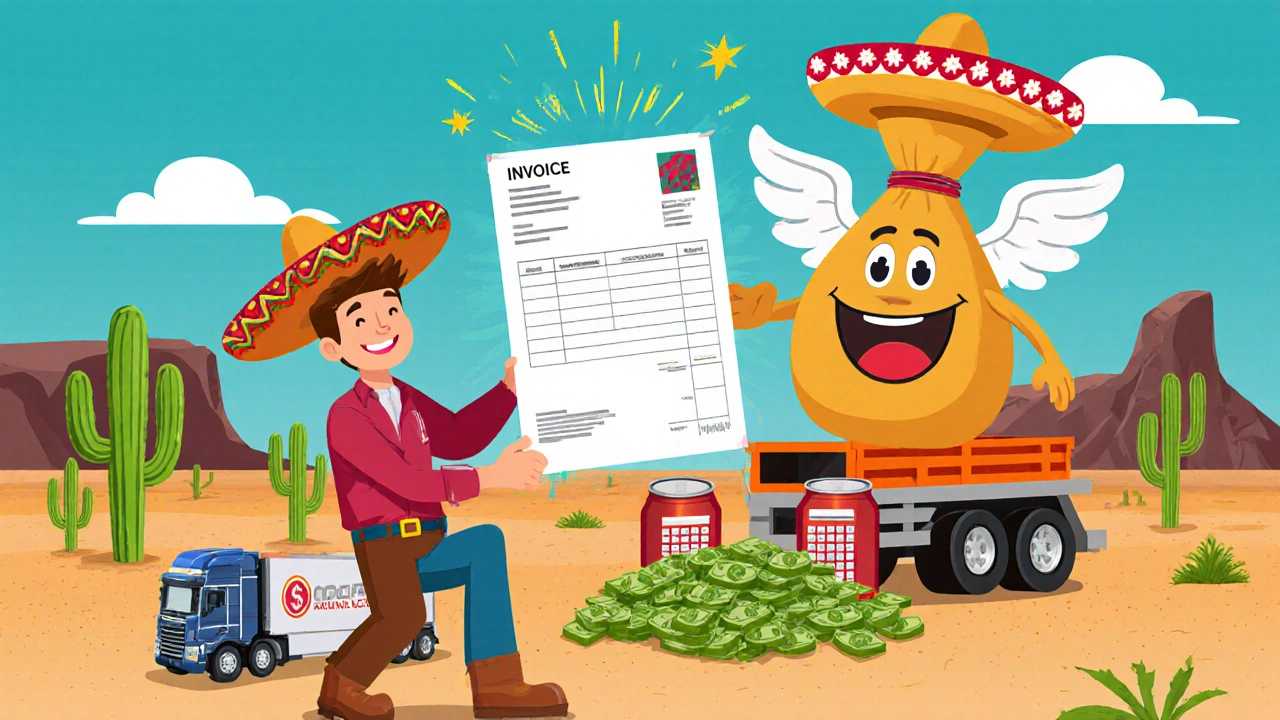Invoice Factoring Fee Calculator
When you factor an invoice, you sell it to a company that gives you immediate cash (typically 80-100% of the invoice value). The factoring company collects payment from your customer and keeps a fee for their service.
Estimated Fees
For an invoice of $ with days payment terms:
FundThrough
Advance Rate: 100%
Fee: 2.75% per 30 days
Total Fee: $
altLINE
Advance Rate: 80-90%
Fee: 0.80% per 30 days
Total Fee: $
eCapital
Advance Rate: 80-90%
Fee: 1.5% per 30 days
Total Fee: $
Pro Tip: For businesses with slow-paying clients (over 60 days), consider non-recourse factoring with providers like Triumph Business Capital to protect against non-payment.
Read the full article for more guidance on choosing the right factoring company for your specific situation.
Running a small business is hard enough without waiting 60, 90, or even 120 days for customers to pay their invoices. That’s the reality for 82% of small businesses, according to U.S. Bank. You’ve done the work, delivered the product, sent the bill-but your bank account stays empty. That’s where invoice factoring comes in. It’s not a loan. It’s not debt. You’re selling your unpaid invoices to a company that gives you cash right away-usually 70% to 100% of what you’re owed-so you can pay your team, order supplies, or cover overhead without waiting. In 2025, with interest rates still high and banks tightening lending, invoice factoring isn’t just helpful-it’s essential for survival.
How Invoice Factoring Actually Works
Here’s how it works in plain terms: You send an invoice to your customer. Instead of waiting for them to pay, you sell that invoice to a factoring company. They give you most of the money-say, $9,500 on a $10,000 invoice-right away. When your customer pays the full $10,000, the factor keeps their fee (usually 1% to 5%) and sends you the rest. It’s that simple. No credit check on your business. No collateral. No monthly payments. The factor cares about your customer’s credit, not yours. That’s why even businesses with bad credit can qualify.
Most factoring companies work in 24 to 48 hours. Some, like FundThrough, can fund within minutes. You don’t need to be in business for years. FundThrough has approved companies with just three months of operation. The only real requirements? You need to have B2B customers who pay on net-30 or net-60 terms, and your invoices should be for services or products already delivered.
What to Look for in a Factoring Company
Not all factoring companies are created equal. Some hide fees. Some lock you into long contracts. Others don’t understand your industry. Here’s what actually matters:
- Advance rate: How much do they give you upfront? Look for 80% or higher. FundThrough offers 100%.
- Fee structure: Is it flat per 30 days? Or does it creep up if your customer pays late? Avoid companies that charge daily fees after 30 days.
- Contract terms: No long-term contracts. Month-to-month is ideal. Watch out for early termination fees.
- Industry specialization: A trucking factor knows how to handle broker payments. A staffing factor knows how to handle payroll cycles.
- Transparency: Harvard Business Review found that 40% of factoring companies inflate costs with hidden fees. Ask for a full fee breakdown in writing.
- Funding speed: If you need cash tomorrow, don’t pick a company that takes 5 days to approve.
Best Overall: FundThrough
For most small businesses in 2025, FundThrough is the clear winner. Forbes Advisor named them Best Overall Factoring Company for 2025-and they earned it. They offer 100% advance rates on invoices, which means you get every dollar you’re owed upfront. Their fee is 2.75% per 30 days, flat, with no hidden charges. No minimum volume. No long-term contracts. You can factor one invoice or 100.
They’ve built an AI-powered platform that integrates with QuickBooks, Xero, and NetSuite. Onboarding takes under 20 minutes. Pre-qualification happens in minutes. Their approval process is fully digital, and they fund within 24 hours-often the same day. They serve over 20 industries, from trucking to staffing to manufacturing. And they operate in both the U.S. and Canada.
Some users complain the fee is higher than others, but that’s because FundThrough doesn’t nickel-and-dime you. No late fees. No per-invoice charges. No surprise costs. If you value simplicity and speed, this is your best bet.
Best for Small Businesses: altLINE
altLINE is the invoice factoring arm of The Southern Bank Company, making it the only major factoring provider in the U.S. that’s backed by a real bank. That matters. It means more security, more stability, and better customer service. They offer advance rates between 80% and 90%, with fees as low as 0.80% per 30 days for qualified clients. Same-day funding is available for many industries.
They’re ideal for small businesses that want a human touch. You get a dedicated account manager who handles invoice processing, collections, and even credit checks on your customers. Their Capterra rating is 4.5/5 based on 89 reviews, with small business owners praising their responsiveness and bank-backed reliability. The downside? They cap invoices at $5 million, so they’re not for huge contracts. But for most small businesses, that’s more than enough.
Best for Large Invoices: eCapital
If your invoices are over $1 million, eCapital is one of the few companies that can handle it. They specialize in large-volume factoring with invoice limits up to $30 million. Their rates start at 1.5% per 30 days, and they offer both recourse and non-recourse options. Their AI system approves applications quickly, often within hours.
But here’s the catch: Trustpilot reviews show a 3.2/5 rating based on 147 reviews. The biggest complaint? Fees pile up if your customer pays late. Some users reported paying 5% or more in total fees because their clients took 60+ days to pay. If you’re confident your customers pay on time, eCapital is powerful. If not, you could end up paying more than you save.

Best for Trucking and Transportation: Triumph Business Capital
Trucking companies face unique problems: brokers who don’t pay, fuel costs, equipment repairs, and tight margins. Triumph specializes in freight factoring-and they do it well. They offer instant payments within minutes for owner-operators and fleets. Their non-recourse contracts protect you if a broker goes bankrupt. They also provide fuel cards, 24/7 broker credit checks, and even equipment financing.
According to Small Business Trends, trucking companies that use specialized factors like Triumph report 23% higher satisfaction than those using general factoring companies. RTS Financial is another top choice in this space, with rates starting at 1.8%. If you’re in trucking, don’t waste time with a generalist. Go with a specialist.
Best for In-Person Service: Riviera Finance
Not everyone wants to do everything online. Riviera Finance has 25+ physical offices across the U.S., making them the only major factoring company that still offers in-person onboarding. They’ve been around since 1969 and have served over 20,000 clients. They offer up to 95% advance rates, 24-hour funding, and non-recourse options.
Google Reviews show a 4.1/5 rating, with trucking clients praising their non-recourse protection. But small manufacturers report mixed experiences-some say their account managers lack industry knowledge. Their biggest limitation? They cap individual invoices at $500,000. So if you’re doing large-volume manufacturing or wholesale, this might not scale. But if you prefer face-to-face support and your invoices are under half a million, Riviera is a solid pick.
Best for Low Fees: Universal Funding and 1st Commercial Credit
If your priority is saving on fees, look at Universal Funding and 1st Commercial Credit. Universal Funding offers rates as low as 0.55% per 30 days with 95% advance rates. 1st Commercial Credit has rates between 0.69% and 1.59%, with no minimum funding requirements. Both are good options if you’re confident in your customer payment timelines and want to minimize costs.
But low fees don’t always mean better value. Some of these companies have slower funding times, less support, or hidden terms. Always read the fine print. A 0.5% fee with a 3-day funding delay might cost you more in lost opportunities than a 1.5% fee with same-day cash.
What to Avoid
Here are the top three mistakes businesses make:
- Signing long-term contracts: You should never be locked in for 6, 12, or 24 months. Month-to-month is standard. If they insist on a contract, walk away.
- Ignoring fee structures: Some companies charge 2% for the first 30 days, then 0.5% per day after. That’s 35% in 60 days. Always ask: “What’s the total cost if my customer pays in 60 days?”
- Choosing a generalist for a niche industry: A staffing company needs a factor that understands payroll cycles. A trucking company needs one that knows how to handle broker payments. Don’t assume any company can handle your business.

How to Get Started
Getting started is easier than you think. Here’s your step-by-step:
- Check your invoices: Do you have B2B customers who pay in 30 to 90 days? If yes, you qualify.
- Compare 2-3 providers: Use the criteria above. Don’t pick the first one you see.
- Ask for a fee breakdown: Request a sample calculation for a $10,000 invoice paid in 30, 45, and 60 days.
- Apply online: Most applications take 15-20 minutes. You’ll need your business bank statements and 2-3 sample invoices.
- Notify your customers: Most factors require you to inform your clients that payments should now go to the factoring company. This is standard and legal.
- Get funded: Within 24-48 hours, your cash is in your account.
Is Invoice Factoring Right for You?
It’s not for everyone. If you have strong cash flow, low overhead, and customers who pay on time, you might not need it. But if you’re:
- Struggling to pay your team or suppliers,
- Turning down new projects because you can’t afford the upfront costs,
- Reliant on slow-paying clients in industries like staffing, trucking, or manufacturing,
then invoice factoring isn’t just an option-it’s a lifeline. The U.S. factoring market hit $3.2 trillion in 2025, and it’s growing fast. More businesses are choosing it because banks won’t lend, and credit cards are too expensive. Factoring gives you control over your cash flow without taking on debt.
Frequently Asked Questions
Does invoice factoring hurt my credit score?
No. Invoice factoring doesn’t show up on your personal or business credit report because it’s not a loan. The factor is buying an asset (your invoice), not lending you money. Your credit score remains unaffected.
How much does invoice factoring cost?
Fees typically range from 0.5% to 5% per 30 days, depending on the company, your industry, and how quickly your customers pay. For example, a $10,000 invoice with a 2% fee costs $200 if paid in 30 days. If payment is delayed to 60 days, the fee could double unless the company uses a flat rate. Always ask for a full cost breakdown before signing.
Can I factor invoices from government clients?
Yes, but only if the factoring company is compliant with the Federal Assignment of Claims Act. Not all do. Make sure the provider you choose explicitly states they handle government invoices. This is common in construction, defense contracting, and healthcare services.
Do I have to factor all my invoices?
No. Most factoring companies let you choose which invoices to factor. You can factor one invoice a month or 50. This flexibility makes it ideal for businesses with irregular cash flow or seasonal spikes.
What happens if my customer doesn’t pay?
It depends on whether you chose recourse or non-recourse factoring. With recourse, you’re responsible for repaying the factor if your customer defaults. With non-recourse, the factor eats the loss-usually for a higher fee. Non-recourse is ideal if you’re worried about client bankruptcy, especially in industries like trucking where brokers can vanish.
How long does it take to get approved?
Most companies approve applications within 24 to 48 hours. FundThrough and altLINE can approve you in minutes with their digital platforms. If you need in-person service, like with Riviera Finance, it may take 3-5 days. The key is having your documents ready: bank statements, invoices, and business license.
Next Steps
If you’re serious about improving your cash flow, start by comparing three companies: FundThrough for speed and simplicity, altLINE for bank-backed reliability, and Triumph for trucking. Get sample quotes. Ask for fee breakdowns. Read reviews from businesses in your industry. Don’t rush. The right factoring partner can turn your cash flow problems into growth opportunities.

Kenny McMiller
November 18, 2025 AT 07:56Let’s be real-invoice factoring is just deferred receivables monetization wrapped in fintech glitter. The real win isn’t the 100% advance rate-it’s the operational liquidity arbitrage. You’re essentially converting non-cash assets into working capital with zero balance sheet impact. That’s not financing, that’s structural cash flow engineering. FundThrough’s AI integration? That’s the secret sauce. They’re not just advancing funds-they’re automating the entire credit risk attribution layer. The fee structure? Flat per 30 days is the only sane model. Daily accruals are predatory. And yes, non-recourse is non-negotiable if you’re in trucking or staffing. Brokers ghosting invoices is a systemic risk. Factoring isn’t a Band-Aid-it’s a pivot to cash-based growth architecture.
Dave McPherson
November 19, 2025 AT 01:21Ugh. Another ‘best of 2025’ list written by someone who thinks ‘same-day funding’ is a revolutionary concept. Newsflash: this has been around since the 1950s. And now we’ve got influencers treating it like a crypto whale drop. ‘FundThrough offers 100%’? Cool. So does every other factor that’s desperate for market share. The real story? The 2.75% fee is a bait-and-switch. If your client pays in 45 days, you’re paying 4.125%. They don’t tell you that because they want you to think it’s ‘simple.’ And altLINE being ‘bank-backed’? That’s like saying your Uber driver has a driver’s license. Doesn’t make the ride safe. The only thing worse than factoring is pretending it’s not a last-resort hustle for businesses that can’t manage their own damn receivables.
Julia Czinna
November 20, 2025 AT 05:31I appreciate how detailed this breakdown is-especially the part about industry specialization. I run a small staffing firm, and we tried a general factoring company last year. They didn’t understand payroll cycles, so we got stuck with delayed payouts and extra fees. Switching to a factor that knew how temp labor invoicing works changed everything. We went from 45-day waits to 24-hour funding, and our team actually started getting paid on time. Also, the tip about asking for a sample calculation for 30/45/60-day scenarios? Game-changer. I wish I’d done that before signing anything. Don’t just go for the lowest fee-go for the one that gets you cash when you need it, without hidden traps. And yes, month-to-month is the only way to go. No contracts. Ever.
RAHUL KUSHWAHA
November 21, 2025 AT 15:18Thank you for this. 😊 I’m from India and we don’t have many factoring options here, but I’m learning. Your explanation helped me understand why this works better than loans for small B2B businesses. I’ll share this with my cousin who runs a small manufacturing unit. He’s been struggling with late payments. This might be his way out. 🙏